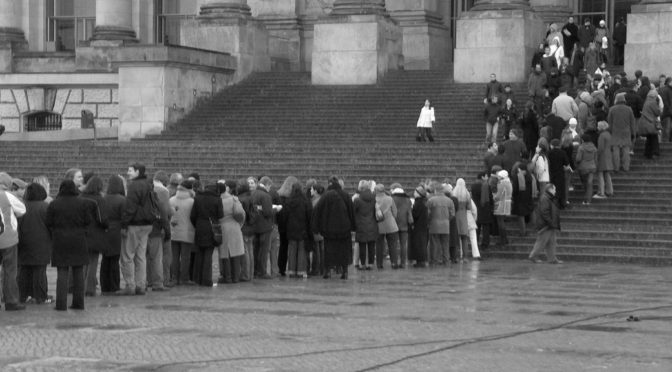by David Cain at Raptitude
A few months ago someone asked me to point them to everything I’ve written about patience: what it is and how to develop it. I don’t think I’ve ever addressed the topic directly, even though I’ve danced around it a lot.
I now consider patience to be a pretty fundamental life skill, one which directly determines whether a particular elevator ride, social event, drive home or post office visit is an easy experience or an awful one. Whether we can be patient or not is a high stakes matter, because life is at least 90% those kinds of experiences.
I guess some amount of patience develops inevitably, as you get older and gradually realize how self-defeating it is to revile the present, since you spend every instant of your life there.
Still, I can’t recall ever being explicitly taught patience, only being commanded to “be patient!” by teachers, parents and other authority figures. I suspect most people learn the concept in exactly this sort of context, as something that’s no fun at all yet is deemed necessary by adults for reasons they can’t explain, like “work” or “honesty”.
And of course they don’t tell you how. Nevertheless, over the decades I have caught on to its uncanny ability to make life vastly less painful, and have even learned to cultivate it on purpose. So I will tell you what I know, inquiring reader from months ago, and anybody else who’s interested. Apologies for the wait.
Patience is really nothing more than the willingness to live life at the speed at which it actually happens. And of course, life only ever happens at the speed at which it actually happens, whether what’s currently happening is fun or not.
However, our willingness to accept that reality isn’t something we do automatically, and that willingness makes a huge difference to the quality of our experience in life.
Sometimes we can speed up the boring or unpleasant parts with a timely request or suggestion, but impatience doesn’t exactly help us do that. Stewing in a queue doesn’t make it move more quickly, it just makes the time you’re already spending there more unpleasant.
This kind of stewing is just a basic urge to deny reality, which—I’m very sorry—includes many stretches where we are not getting what we want, where no uncertainty is being resolved and no wishes are being fulfilled.
That’s not ideal, but what makes those dry stretches go from unremarkable to insufferable is our trying to live as though they shouldn’t exist, like they’re some kind of cosmic mistake. What? The plane needs some unexpected maintenance? I didn’t agree to that!
Impatience means demanding the impossible
Actually being in a place or a time other than here and now is impossible, so we escape to the only alternative to reality, which is our imaginations. Sometimes we just daydream haphazardly, but often the imagined reality we escape to is directly related to the thing we’re being impatient about. While you’re waiting at a checkout, your mind is off lecturing some unseen manager about how many cashiers a respectable drug store should have working at, you know, whatever time it is right now.
None of this rumination does what we want it to do, which is to warp space and time such that we aren’t required to ever experience someone else’s petty customer dispute or PowerPoint presentation. Impatience is always stabbing at the impossible: to transport yourself to the wrap-up of this wedding toast, to fly through this needlessly heavy revolving door, to banish from existence this disgruntled customer who’s now making the clerk call the manager.
Let’s be clear that the experience of impatience has nothing at all to do with your ability to help the situation move along more quickly. If there’s something helpful you can do, it can be done without impatience. And often the real symptoms of impatience—the fidgeting, the fuming, the self-righteous inner diatribes, the “why me” feeling—don’t arise until it’s clear you’re quite powerless over the proceedings anyway.
We can’t transmute reality, but patience can transmute our relationship to reality to a considerable degree. And that solves the real problem, which is not the specific circumstance we’re in, but the quality of our experience right now: is it awful or is it okay? Patience makes it okay for life to be what it is, which is extremely helpful, because life is always just what it is.
Giving time
Impatience is a reflex; it will rarely appear to you as a conscious choice. We can retrain the reflex to a different one though, during moments when we’re not confronted by a gridlocked expressway or a misbehaving printer, by getting used to the idea of giving time.
Every day, there are countless easy tasks we perform that don’t require our full attention. For example, when you’re done with the blowdryer, you probably wrap up the cord and put it in the cupboard. But because it’s not exactly brain surgery, chances are your mind is already onto something else—breakfast, work, global politics—for that ten or twelve seconds that your body is doing the task.
This is a subtle instance of the mind trying to skip reality again. But because the reality of putting away a blowdryer isn’t difficult to experience willingly, it’s a perfect opportunity to become more patient, by giving it your full attention anyway.
Rather than spend another twelve seconds uselessly ruminating about the past and future, consider giving that time instead to what is actually happening: the simple task of wrapping up the cord and putting the thing away.
“Giving time” in this way—being fully, willingly aware of the buttoning of a shirt, the sealing of an envelope, the peeling of a carrot—acts as a small but effective challenge to the mind’s habit of trying to constantly get away from real life.
Ten or twelve seconds at a time, we learn not to be so squeamish about simply being where we are, and letting life unfold at the speed it actually does.
Give time to some small thing, then feel free to go back to absently ruminating on election reform, or rehearsing a conversation with your neighbor about his dogs. Later on, when it occurs to you, do it for some other small thing.
This isn’t hard at all, and the result is a gradual relaxing of this constant pull we have towards getting the hell out of most of the moments we’re in.
Things begin to open up. Flying, shopping, and customer service experiences become easier. Errands and social obligations become less fraught, less dreadful. Life as a whole seems less dangerous, because there’s a lot more of it that you’re willing to actually experience.
Again, it’s not much. Ten or fifteen seconds here or there, for something you’d normally daydream your way through. Practice this in easy moments, and you’ll find that the impulse to give time might also arise in the tougher moments, when the captain announces a mechanical issue, or when the person who’s supposed to call isn’t calling.
Each offering of time is a small but powerful act of generosity towards our own well-being. By doing this we’re making the brilliant chess-move of giving at moments where we’re normally very stingy and needy.
The ability to make this expert move changes everything. What a relief it is to discover that you don’t need to avoid experiencing life’s inevitable (and frequent) slowdowns, and that the pain associated with them is almost entirely created by relating to them unskillfully.
What, I can experience an entire trip to the mall without sighing, grimacing or silently cursing? I can sit through an entire red light without fidgeting? I can make (or miss) my connecting flight without losing my shit even once? Can I live my whole life this way?
We can, if we’re willing to give time, as a habit. Nothing else makes sense really—it’s just experimenting with a willingness to live in reality as though there’s nowhere else to be. (Not that there ever was.)


